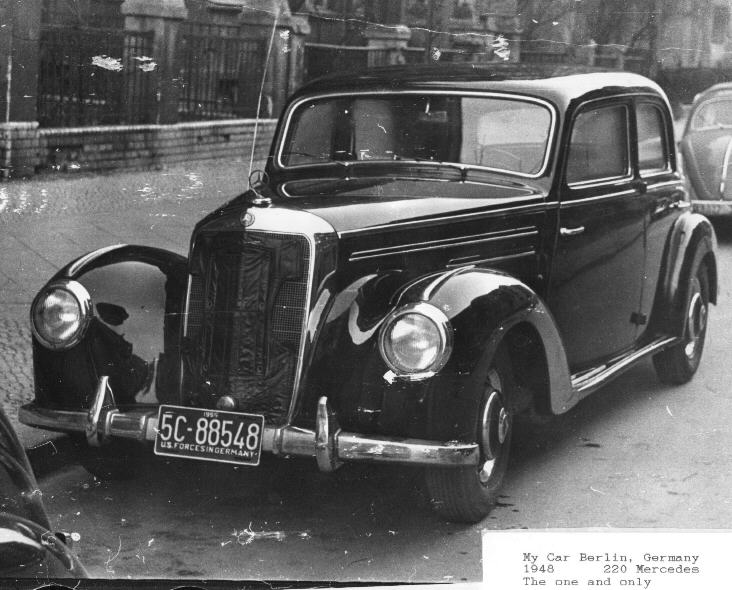

After a furlough I was assigned to the replacement center at Fort Dix. I hate replacement depots and when they asked me if I wanted to hang around to go on the boat with the general, I declined, saying I should arrive there before him. I was placed on a commercial airliner. We finally landed in Frankfurt Germany and there we were to be assigned to our units. Someone failed to read my orders, "on the staff of", and I was on orders for another MP unit in Germany. I called the error to their attention and everyone got in gear and changed the orders to Berlin.
There was another problem. My serial number was incorrect on the Russian translation. The Russians wanted everything correct or they would not let you through their zone. No time for change, so I was allowed to go. No problems and we arrived in Berlin the next day. A staff car was waiting as was a captain and a master sergeant. I was greeted by the captain and the master sergeant carried my duffel bag to the car. I never had that much attention when I was an officer.
Everyone thought I was the General's driver, and I was assigned to Headquarters Company. I asked to ride with the MP patrols, so I would become familiar with my way around. The General had been concerned about troop morale and the venereal disease rate, and I had been told to report to him on those things or any other problems I might see. I continued gathering information, and when the General arrived they found out I wasn't a driver, and I was sent to the MP company.
There I was put in charge of the Provost Marshal's Traffic Accident Section (TAPS). The American sector of Berlin had eight military police patrols and a TAPs unit on duty at all times. We also had the last Horse Platoon in the Army. As the TAPs chief I was privileged to know the number of undercover vehicles in use by the US intelligence units. The figure was very high. These were vehicles, which were German in appearance, the drivers were identified as German by ID cards, clothing, drivers' licenses, etc. Once in a while one would disappear and I would be contacted, by telephone, so I could check our files and the German files. My contact was by telephone alone, but I did have a name to ask for when I initiated the call.
The Germans had changed their vehicle laws, so that every vehicle would be required to have two outside mirrors. When the time came all vehicles met the new requirements except the undercover vehicles. The intelligence agencies were too busy playing their games, so they failed to make the change. I received a call one day and my contact was very upset, as the vehicles were open to compromise because they were being ticketed. What could be done? "Simple", said I, "obey the law as the real Germans do. Put on the mirrors".
I did leave my mark in another way. I noticed that the Germans ignored the MP sirens and red lights. German Police used blue lights and an oscillating siren. My suggestion to the General was to equip our cars with the same warning devices. Twenty-five cars were refitted. The results were great because the Germans didn't know if it was their police car or ours, so they obeyed.
At that time Berlin was divided into four sectors: Russian, French, British and the American sector. The wall between the east and west had not been built yet. Travel into the Russian sector was restricted, but the occupying forces could enter with their normal identification. After a GI arrived in the city he was required to qualify with all small arms and to drive vehicles up to and including tractor trailers and buses. I had a good time putting the tractor and trailer up on the sidewalks on some of the back alleys.

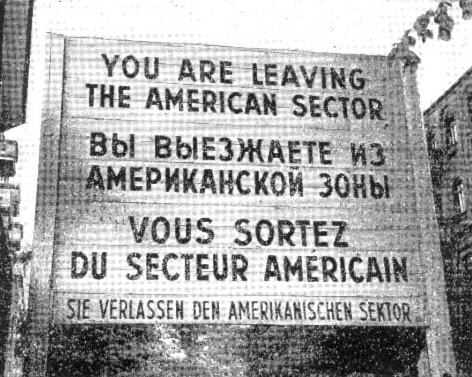
I was sent into West Germany several times, one time to help set up a Traffic Accident and Prevention school at the Military Police and Intelligence School at Oberammergau. The other time the General sent me to go to the military rest camps in Garmisch to come back with ideas for converting Funk's villa (Hitler's minister of finance) on Wannesee (lake) to a place where GI's could go to to relax on a pass. It took more than a three-day pass to go to West Germany and return and time off over three days was limited due to the nature of their mission. I drove my Mercedes south until I was south of the Hartz Mountains. I stopped at a little village for the night. There was a wedding party, at the Gasthaus, and I was invited to join the party, which I did. About 25 miles south of there, while looking for an old Roman road, I came upon a village named Reichardsroth. I didn't have time to look into it, so I took a picture of the sign and headed south to Garmisch. I returned to Berlin and the rest camp was opened and some of my suggestions were utilized.
Shortly after my arrival in Berlin, my first sergeant took me to his favorite cafe, the Grunewald Eck. It was just inside the British sector. No GI's, just a quiet, small, neighborhood cafe. It became my favorite place and it wasn't long before I was invited to the owners table on a nightly basis. The owners also sold cars and it wasn't too long before they sold me a car. It was a 1948 Mercedes 220, four-door sedan. It was a classic, but little did I know that the speedometer had gone around at least once as it had been owned by a doctor. It was in that little cafe that I met people from the business, theatrical, model, and boxing worlds. It was there too that I met the young beautiful wife of a Berlin doctor (Dr Wohlgemuth), who had kidnapped the head of West German intelligence (Dr Otto John) and carted him off to the east. One of the cafe owners told me the girl had gone to the doctor as a teenager and he gave her a treat instead of a treatment. When the girl's grandmother heard about it, she headed to his office, umbrella in hand, and had the doctor set the wedding date.
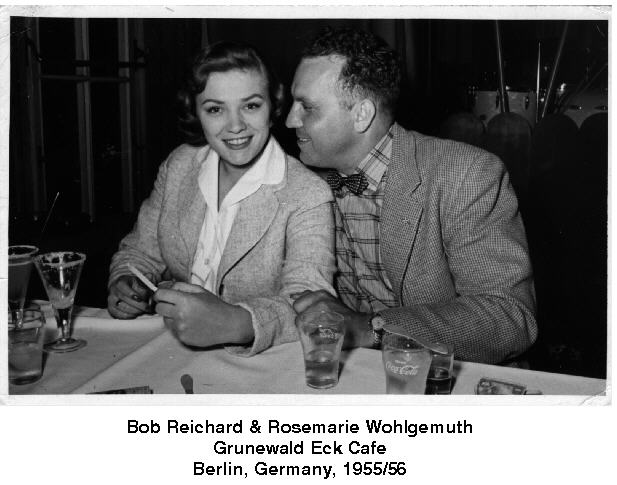
The city had nine eligible young females for every male at the time I was there. One was more beautiful than the other. I have never seen a city that could compare. The lack of fatty foods, during the war years, and the lack of transportation caused them to use the bicycle and walking kept them trim.
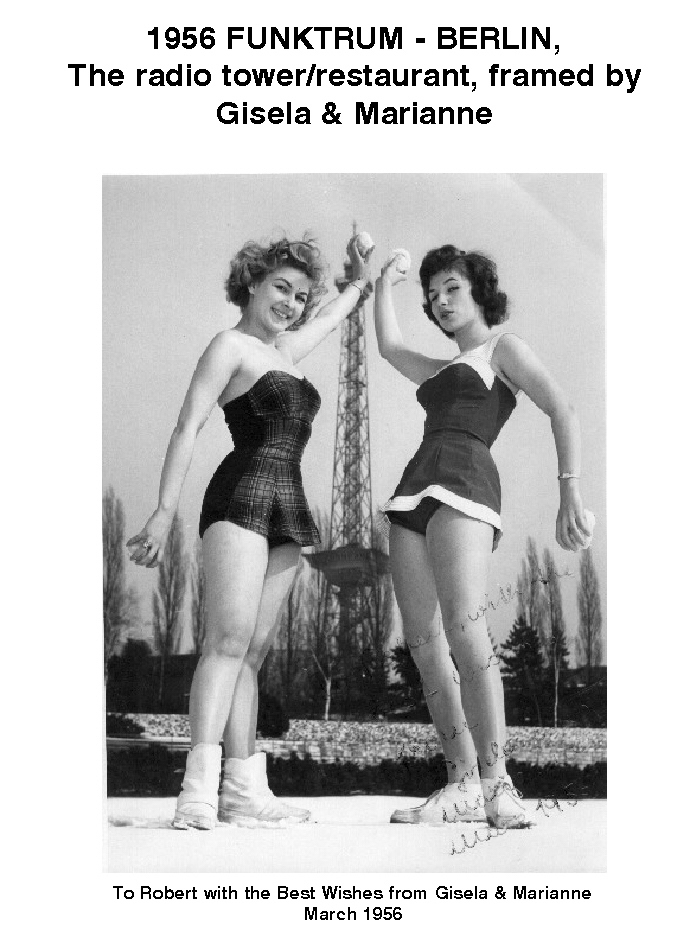
I don't know whether it was the beer, late hours, or early morning calisthenics, but I wound up in the US Army Hospital there. I couldn't seem to get warm and they thought I had malaria. No malaria, I was just in need of rest. My German friends showed up at the hospital, wine in hand. The wine went to a nurse and I went back to duty. After that I would rest, after work, for a couple of hours and then go out for the evenings.
There are so many stories to tell, so I will select some to tell here. I had difficulty understanding the German language, but there was usually someone who would interpret. I was told that we were going to the movies the following evening, or so I thought. I dressed for the event, brightly colored sport coat etc. That evening we went to the Schiller Theater to see the stage show Peer Gynt. We were late arriving, so we were not allowed in until the intermission for late comers. They opened the auditorium side door and I saw that everyone was in conservative dress. It seemed as if the entire audience looked in my direction. I guess they thought I was part of the show. I couldn't wait to get seated. More surprises, the lead actor and one of the other actors were two of my friends from the little cafe.
I was in the cafe another time and a man came in, who I thought was the local drunk. He couldn't speak good English, but I found out he wanted me to go with him. Some of my friends told me it was OK. We entered a taxi and he handed me 1000 DM ($250). He told me I was to pay the bills with the money. We went nightclub hopping. The Golden Horseshoe had horses in the show, and the smallest club was the Kline Scala. There was two musicians there, one playing the violin the other the piano, both playing classical music. My friend asked me what I wanted to hear. I replied, Schubert, and he took some of his money, gave them a big tip and the sounds of Schubert filled the club. A flower lady came in selling her flowers and he bought me a bouquet. This was an accepted German custom, but I looked around and gave the flowers to a lady in the club. That gave my friend a new idea, so he told me to buy flowers for all the ladies, which we did. It was quite a night.
I found out later that this man was a millionaire. Cars were expensive to own in Germany, but he had a Mercedes, his wife a Carmen Gia, and his son a Porsche. Some time later I was invited to his apartment for dinner. I was greeted at the door by a maid, they also had a nurse for their young son. His library had a first edition Bible and along the wall, on one side, was an aquarium divided in two, one part with fresh water fish and the other saltwater. The dinner was wild boar. I learned later that the reason for the night on the town was the result of a spat with his wife.
On one of my visits to the Cafe I learned that Dr Wolfgang Wohlgemuth came to West Berlin from East Berlin frequently. He drove a Buick and I guess the plates might have been American. I gave the information to the CIC unit at the Berlin Command Headquarters. The doctor was apprehended on 11 Feb 1957 during one of his border crossings. Otto John, the West German security chief, had escaped previously from the East in the car trunk of a Swedish reporter. He had been kidnapped on 20 July 1954. His captivity had lasted 17 months.
The Berlin businessmen that I met had one thing in common. They reserved the weekends, especially Sunday for their wives and children. Other evenings they were in the company of their young girlfriends. The Berliners were some of the nicest people I had ever known.
Through other friends I found the Bruno Mueller Boxing Camp. It was on Clay Allee and was a training camp for boxers. It also had a cozy bar. There I met the Berlin models, boxers, champions and ex-champions. When the owner got married I was the only American invited. The bar was very small. It probably seated ten people and had tables for about twenty more. There were tables in the garden for use in the spring and summer. I knew the German middle heavy weight and his wife, and the German who had taken over the title from Max Schmelling. He was a sports instructor for East Germany and was allowed to cross the border at will. His day there was usually on a Sunday accompanied by his wife. I watched Hecht, the middle heavy weight, battle an Englishman for the title in the Sports Palace. It was a terrific fight. They both lasted, but the Englishman was declared the winner. It was there that I saw the custom of males giving other males flowers. Both fighters received bouquets of flowers before leaving the ring. The giving of flowers was very much evident during birthday celebrations. During a return visit to Berlin I stayed in a room at the camp.

From time to time I was called to the Berlin Command Headquarters to brief the General. On one occasion I was in the secretary's office waiting admittance when the, gruff, chief of staff, with a chest full of medals challenged my being there. At his approach I had rendered the necessary military courtesies, and the secretary saved the day by explaining my presence. He turned and left without comment. He was supposed to be aware of all happenings, so my presence must have been a blow to his ego.
There were many events and things to do and see. One event was the British Queen's birthday celebration (an annual event worldwide) by her troops in the Olympia Stadium.

Things to see included the buildings of a modern city. Most buildings had been destroyed or damaged. The exception to this was the Kaiser-Wilhelm Church, which was rebuilt, leaving some outward war damage as a reminder to the future generations that war is not a trivial matter.

I was also escorted through the much secret room controlling allied air traffic in and out of the Templehof Airfield. Outside the airport is the memorial called the Luft Brucke (Air Bridge), which is a memorial to those who gave their lives keeping Berlin supplied during the Russian blockade of Berlin.
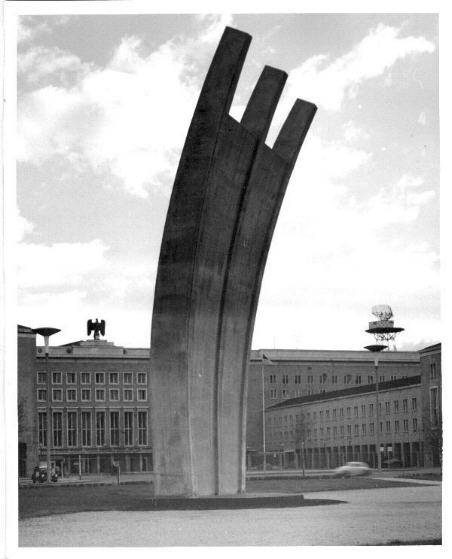
In late 1955 or early 1956 I went to the Special Services building in Andrews Barracks Berlin. I entered the main floor and went up the steps to the second floor. I turned to walk to the photo processing room. As I looked down the corridor there was John Wayne talking to a soldier. When I approached Wayne the soldier walked away. I walked over to Wayne and we shook hands passed the time of day and then I walked on. One thing I remember about him, I am six foot tall, but I had to look up when I talked to him.
Years later I told this story to a Friend. He asked me if I had gotten John Wayne's autograph. I told him "No, because I was waiting for Mr Wayne to ask me for mine, because he had only played the military and I had lived it."
My other close friends were not always German, but most were. There were government secretaries (female of course), a night club singer, a member of Interpol, Army nurse, and an airline stewardess.
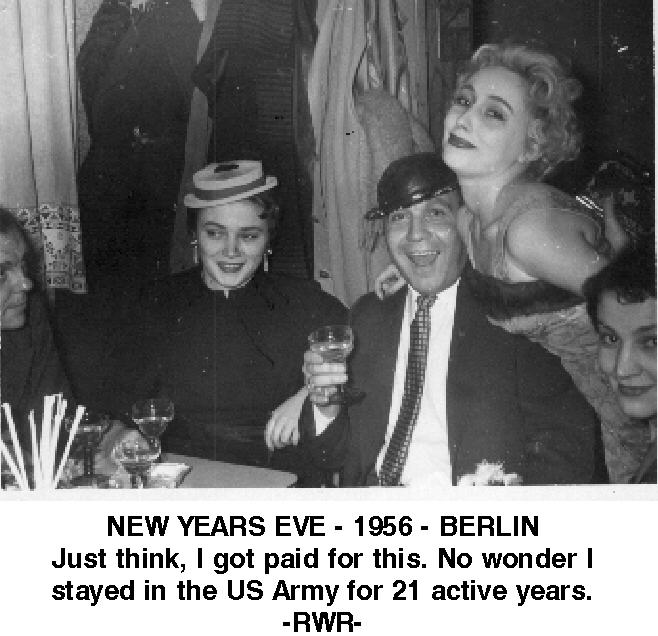
The General was promoted and assigned to the 11th Airborne Division at Augsburg, Germany. I was given the chance to go or stay behind. I decided to go airborne. Prior to our departure I drove his civilian car to Augsburg. I left the car at Flak Kaserene and was taken to Munich by the Military Police. At Munich I met the General who had been there for an advance briefing. We boarded his plane for the trip back to Berlin. He sat there studying a book, which contained the history of the new unit and the history of the area. I kept quiet as he studied the book. It was there and then that I realized the scope of his responsibilities. Yes, other than the crew we were the only two on board. When we landed, at Templehof, his staff car and German driver were waiting. He headed to his quarters and told the driver to take me wherever I wanted to go. Remember it is 1956. I asked the driver to stop, so I could call my girlfriend and he said I could use the car phone. I did so and when my girlfriend asked me where I was I said in a car riding down Clay Allee, that was hard for her to believe.

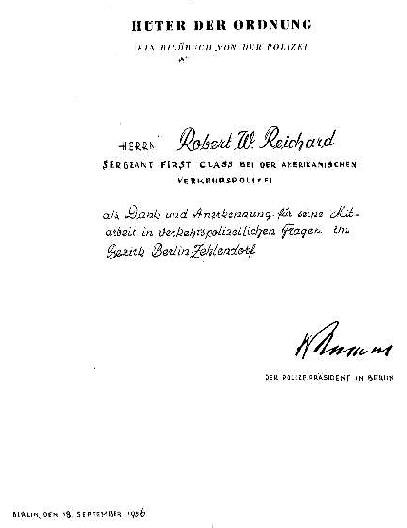
| Table of Contents | Previous Page | Next Page |